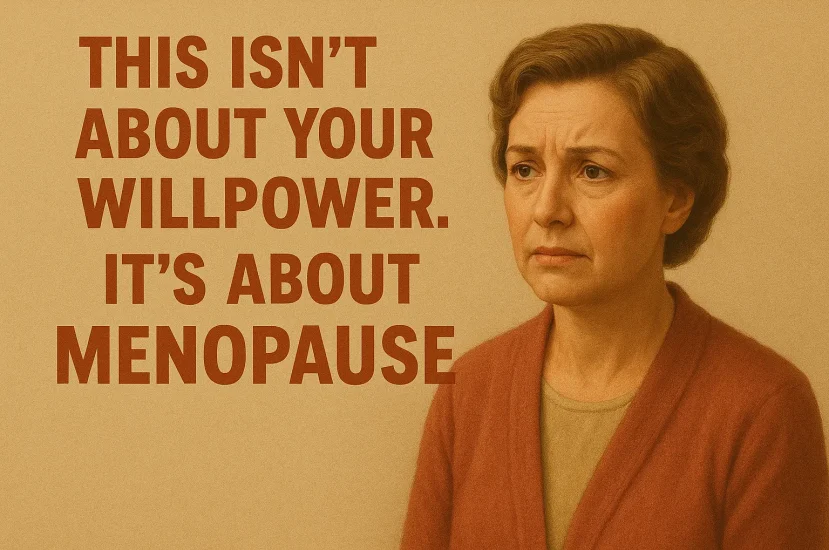The Truths We Need to Say Out Loud
- This isn’t about your diet. This isn’t about your willpower. The shape of your body is changing because the fundamental hormonal operating system you’ve had for 30 years is being rewritten.
- The fat around your middle isn’t a sign you’ve “let yourself go.” It’s a biological response to the departure of estrogen. It’s science, not a personal failing.
- You’re losing muscle, even if you’re active. This is the secret thief that slows your metabolism to a crawl and makes everything feel ten times harder.
- Feeling exhausted, stressed, and moody isn’t just “in your head.” It’s the chemical cocktail of this transition, and it directly impacts your hunger and what your body holds onto.
- Fighting your body with the old rules (eat less, run more) will feel like punching water. It’s exhausting and it won’t work. We need a new strategy.
Our Conversation Guide:
The Dressing Room Moment
Hi, I’m Diana. I want to talk about a moment. A moment I know many of you have had. It might have happened under the harsh, unforgiving lights of a department store dressing room. Or maybe when you saw a candid photo someone tagged you in online. Or maybe it was just a quiet morning, looking in the mirror, when you felt a sudden and shocking sense of disconnect. The moment you looked at your own body and a voice inside whispered, “Whose body is this?”
The softness where there was once firmness. The curve of a belly you don’t recognize. The feeling that no matter how good you are, your body is on a completely different path. And with that feeling comes a wave of shame, frustration, and the crushing belief that you must be doing something wrong.
I am here to tell you, with every ounce of conviction I have, to let go of that shame. What you’re experiencing is not a failure of character. It’s one of the most profound and misunderstood biological transformations of a woman’s life. Let’s talk about what’s really going on.
The Great Betrayal: Why Your Body Feels Like a Stranger
For decades, you and your body had a contract. You knew the rules. If you ate a little cleaner, moved a little more, the results would show up. You understood each other. Perimenopause and menopause come in and tear that contract to shreds.
The reason it feels like a betrayal is because it is a biological one. The CEO of your hormonal system, estrogen, has turned in its resignation. And without its leadership, chaos ensues:
- The Fat Migration: Estrogen was the traffic cop that directed fat storage to your hips and thighs. Now, the traffic signals are gone. The new default destination? Right around your midsection. It’s a physiological shift, not a moral one.
- The Muscle Heist: This is the silent part of the story that does the most damage. Your body starts letting go of its calorie-burning muscle tissue at an alarming rate. Imagine your metabolism as a roaring bonfire. With every bit of muscle you lose, someone is throwing a bucket of water on it. This is why you can eat the same amount and still gain weight.
- The Cortisol Cascade: This stage of life is… a lot. We’re stressed. And our bodies respond with the stress hormone cortisol, which has a cruel favorite hobby: storing more fat right on top of our bellies. It’s a vicious cycle.
When you put it all together, you see why your old strategies are doomed. You can’t outrun your hormones. You can’t starve a metabolic slowdown into submission, and frankly, trying to can lead to a damaging cycle of yo-yo dieting. It’s time to stop fighting a war you can’t win and instead, change the terms of engagement.
A New Contract With Your Body: 6 Acts of Rebellion
The diet and anti-aging industries want you to see this phase as a problem to be fixed, a flaw to be corrected. I see it as a call to get smarter and stronger. Here are the new terms of your contract. Think of them as acts of rebellion against the idea that you should be shrinking.
- Rebellion #1: Eat to Defend Muscle. Forget “diet food.” Start thinking about protein as armor. Every meal, every snack, ask yourself: “Where is my protein?” Eggs, Greek yogurt, chicken, fish, beans, tofu. This isn’t about deprivation; it’s about giving your body the raw materials it desperately needs to hold onto its strength.
- Rebellion #2: Lift Something Heavy. Long walks are lovely, but now is the time to ask your muscles to work. Lifting weights (or your own body) sends the most powerful signal possible to your body: “DO NOT get rid of this muscle. We NEED it.” This is the single most effective way to keep your metabolic bonfire from turning into embers.
- Rebellion #3: Treat Sleep as Sacred. We treat sleep like a luxury, but in this phase, it’s your medicine. Lack of sleep sends your hunger hormones into a frenzy and makes your stress levels skyrocket. Make your bedroom a sanctuary. Guard your sleep fiercely. It is not optional.
- Rebellion #4: Question the Quick Fix. That glass of wine at the end of a stressful day feels like a relief, I know. But it’s also empty calories, a hot flash trigger, and a sleep disruptor. I’m not saying never have it, but be brutally honest with yourself about whether it’s truly serving your body right now.
- Rebellion #5: Calm the F*ck Down. Your nervous system is on high alert. You must find a way to bring it down. Five minutes of deep breathing. A walk without your phone. Lying on the floor with your legs up the wall. This isn’t fluffy self-care. It’s actively lowering the cortisol that is working against you.
- Rebellion #6: Speak Kindly to the Woman in the Mirror. This is the hardest one. Your body is working overtime to navigate an incredible upheaval. It’s doing its best. When you look in the mirror, stop the litany of flaws. Just for today, try saying, “Thank you. We’re in this together.”
This Isn’t an Ending. It’s a Becoming.
There’s a narrative that this is when women start to fade, to become invisible. I call bullshit on that. This is the moment we can stop spending so much energy on being what the world wants us to be, and start investing that energy into being strong, resilient, and wise.
This physical transformation, as challenging as it is, is forcing us to learn a new way of caring for ourselves—a deeper, more honest way. It’s not about getting your old body back. It’s about forging a new one: a body that is strong, capable, and unapologetically yours.



